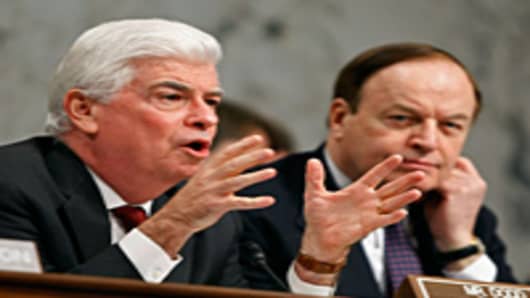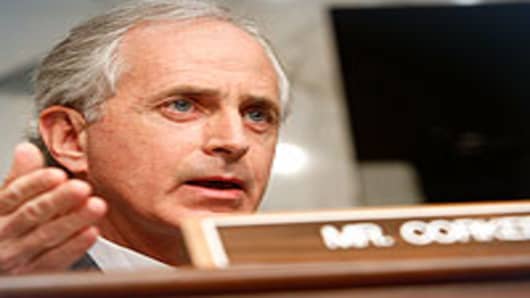Senate Banking Committee members Thursday continued talks in the hope of crafting a bipartisan bill covering sweeping reform of the financial sector, with panel chairman Christopher Dodd signaling that there was still no agreement yet on where and how a new consumer watchdog agency would fit into the current regulatory structure.
"We haven't settled on the Fed as the place for this to be housed," Dodd said in a statement, referring to the GOP proposal this week that would make the agency part of the Federal Reserve, while giving it some measure of rule-making power.
Dodd, however, also appeared to be in sync with the position of the White House and House Financial Services Chairman Barney Frank (D-Mass.) in emphasizing that the agency's powers had to have teeth in them.
“I am pushing for an office with an independent head, appointed by the President and confirmed by the Senate; that has an independent budget to do its work; autonomy to craft rules; and an ability to enforce those rules,” the statement read.
Dodd's latest comments came after one key Republican negotiator Wednesday summed up that day's talks as "the best day yet in the process."
That comment and others from Sen. Bob Corker (R-Tenn.) late yesterday led some to speculate that a deal was imminent after three-plus months of talks.
"We’re really close," Corker said after emerging from the Senate floor. "We’re getting to a place where Democrats and Republicans both can get comfortable with this."
Earlier in the day, sources say, Corker and other GOP senators, including the party's ranking committee member, Richard Shelby of Alabama, pitched Dodd what appearred to be a watered-down version of a Corker proposal from earlier in the week that would place the watchdog agency within the Federal Reserve and have the head of the agency report to the Fed chairman. The central bank already has some consumer protection functions.
Under that plan, the agency would have rule-making power, but not the examination and enforcement powers of a recent Dodd proposal, which Corker and Shelby rejected last week.
Sources say committee members Sens. Judd Gregg of New Hampshire and Mike Crapo of Idaho were also behind the latest proposal. It appears to come out of an all-Republican meeting with Senate Minority Leader Mitch McConnell Tuesday night, according to one source.
Dodd was said to have responded to the latest GOP proposal Wednesday with a counter offer, the nature of which is unknown; his comments today, however, indicate his current thinking is similar to what was contained in his proposal to Republicans a week ago.
Dodd's statement Thursday echoed those of Treasury Secretary Timothy Geithner and Rep. Frank Wednesday.
Geithner told a group of labor and consumer leaders that the Obama administration will only accept a powerful CFPA with rule-making and enforcement authority and sufficient independence, according to one source familiar with the meeting.
Meanwhile, Frank, who worked closely with the administration on the House version of the reform bill, said he was against putting the agency in the Fed, but could accept the Treasury under the right circumstances.
Dodd's most recent proposal did just that, creating a Bureau of Financial Protection with rule-making, examination and enforcement authority.
Congressional Democrats have been generally supportive of such a powerful and independent new agency with a director appointed by the President, which is what the House approved in its reform package late last year and is close to what the White House first proposed.
The GOP, however, has resisted, saying such a structure could potentially clash with existing agencies, creating safety and soundness issues for the financial system. Republicans would also like to see fewer powers and keep the consumer agency out of the Treasury to avoid politicizing it.
Bipartisan talks between Corker and Dodd have taken place on almost a daily basis in recent weeks, with both sides stressing that some differences at this stage are solely in the language of the bill.
Since his first draft was deemed dead on arrival last November, Dodd has been working closely with Republicans, first with Shelby and more recently Corker—after Shelby and Dodd reached an impasse in early February.
Shelby, however, went to work on his own version of a bill, Democratic committee members Mark Warner of Virginia and Jack Reed of Rhode Island have also been been involved in regular negotiations, although they have focused on other subjects such as resolution authority, a system risk council and over-the-counter derivatives. There has been general agreement in those areas.
Though the CFPA issue has been a high-profile, focal point, senate sources say an agreement on derivatives supervision has also been elusive; it may not be included in the draft legislation and would instead be handled as an amendment later on in the legislative process.
Financial reform—always among President Obama's top legislative priorities—has assumed even greater importance since health care reform stalled.




